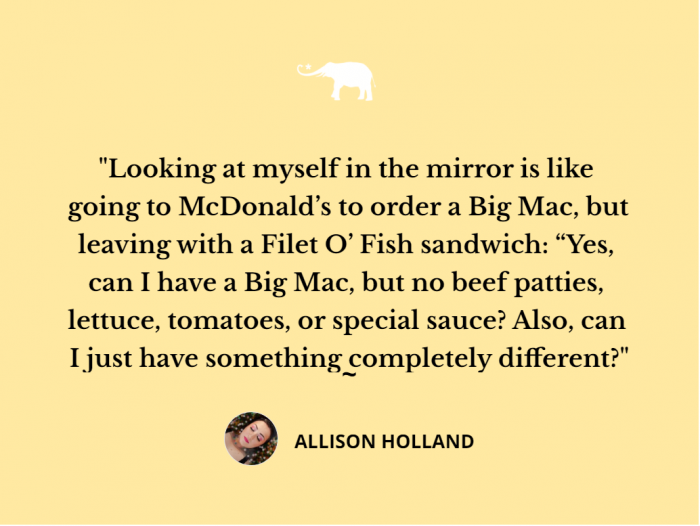View this post on Instagram
Like most of us, for me, 2020 was a year of weight gain, depression, and unrest.
As someone who has struggled with disordered eating for most of her life, the unescapable confinement of quarantine and a sedentary lifestyle that comes along with depression meant coming to grips with the inevitability of gaining weight—with no safe way of losing it quickly. And for a former anorexic person, quickly means 10 pounds a week and being limited to an intake of 500 kilo Cals a day.
In addition to the physical and emotional stresses that 2020 was having on me, my short-lived marriage was collapsing around me…and when you are literally locked in the house with the person who is triggering your body’s innate fight or flight response, 24/7, you’re going to have a bad time.
I have spent my entire life assessing my body for attributes that are acceptable to accentuate, and others that deserve to be hidden.
My complicated history with body image, disordered eating, and reckless behavior in a never-ending quest to be thinner than I had been yesterday nearly cost me my life in my late-teens and early-20s. Thankfully, I have matured out of most of the irresponsible and unhinged behaviors that destroyed so much. But what lingers is the inability to accept my body as it is. Looking at myself in the mirror is like going to McDonald’s to order a Big Mac, but leaving with a Filet O’ Fish sandwich: “Yes, can I have a Big Mac, but no beef patties, lettuce, tomatoes, or special sauce? Also, can I just have something completely different?”
I look at my body and I hesitate to name things about it that I would leave unchanged. I would love to swap my thighs out for someone else’s, like the Frankenstein-Filet-O’-Fish-monstrosity.
Your body is perfect; it’s mine that needs to be changed.
My heart aches for others who struggle with body image because to me and so many others, they are beautiful the way they are. I simply have yet to wrangle the monster inside me who sets fire to my stomach when an ounce of self-acceptance leaks into my psyche.
If I’m too much, go find someone less.
For so many years, I found myself in relationships that fit like pants that were two sizes smaller. I entered them hoping that one day, I would lose the weight and be perfectly suited for partners who were no longer contingent upon having me change myself…because I was now perfect. My defunct marriage was no exception to this. My ex would never hesitate to tell me that if I felt uncomfortable in my skin, I could change my diet or go to the gym. If I was having a bad mental health day and found the courage to say, “I feel ugly today,” I was met with recommendation to seek more intensive therapy. None of these suggestions that my ex made were cruel or inappropriate; they were simply not what I personally needed.
I needed warmth and reassurance.
I have been in therapy since I was a teenager, and that lengthy therapeutic journey has helped me to overcome so much in respect to my disordered eating. I also inherently recognize the benefits of a cleaner diet and more active lifestyle. And in the moments when my cries for help were met with coldness and pragmatism, I knew I wasn’t being provided with what I needed from a person: kindness, grace, and patience. What I didn’t know was that I also needed someone who regularly affirmed that I am okay as I am, even during my lowest moments of self-doubt and loathing.
My body is beautiful.
As healthy and consensual adults are known to do, my partner and I were having an intimate moment a few days ago. For some context, the word “intimate” is the most respectful way to describe it, but Barry White was not playing and there were no candles lit. I am not writing a romance novel; I am simply trying to convey that this was not the setting where I was expecting to hear something so kind and gentle from my partner—who is regularly sweet and attentive in every other moment of our lives. In the middle of our Barry White-less moment, completely unprovoked, he put his hands on my torso and said, “Your body is so beautiful.”
It didn’t occur to me until later that I had never heard someone say that about my body. Not me, not any of my former partners, no one. I never considered that my body was anything other than barely tolerable, and certainly not worthy of admiration. I spent my past relationships trying to shrink myself physically and emotionally in a futile attempt to earn the type of love I never knew I needed. Yet here I was receiving affection and love without having to justify my desire to be loved unconditionally, with the condition of I’ll go to the gym tomorrow.
What does unconditional love look like?
1. Unfettered acceptance, not conditional tolerance.
We all go through the phase in relationships where everything is new and we want our partner to see us looking our best—all the time. But living up to those standards every day when we also must juggle work, household responsibilities, and other obligations is impossible. We all deserve to be accepted in the moments in-between the days when we look and feel our best, when we haven’t showered all day, and break down from the responsibilities that are piling up around us.
2. Our partners are turning in, not away from us.
When we simply have too much on our plates or are having a bad day, what is our partner’s next move? Do they ask how they can support and help us, or do they expect us to carry the weight of these burdens alone and circle back when we are in a better place? Are we extending the same considerations to them?
Some individuals thrive on their independence and want their partners to support them from a distance, but others, like myself, need a partner who is actively engaged in the relationship and is always looking for ways to demonstrate their commitment to our union through loving support. It is the difference between accepting challenges that arise within our partnership as shared or individual responsibilities.
3. Our limitations are accepted, but our boundaries are not pushed.
The adage, “You make me a better person,” should not be seen as a personal challenge. We all want better for ourselves and our partners out of love, but it’s also just as important to recognize and appreciate that our partners have their limitations just as we do. If your partner has anxiety, don’t deliberately put them into situations where they will be triggered and reframe it as a learning experience. Accept your partner for who they are and what they are able to bring to the table rather than demanding they change for you or accepting someone who demands you do the same.
4. We are giving and receiving love for who we are, not the promise of who we will become.
Nothing is more devastating than learning that someone fell in love with their idea of what one day we could become, rather than who we currently are. And this same courtesy should apply to how we treat our partners. No one deserves to only be loved if they change aspects of themselves that make them who they are or values that they hold. Growing with your partner is something that most people desire, but organic growth is facilitated by a healthy and supportive environment, not one where we stifle ourselves in exchange for our partner’s approval.
5. We come as we are.
Can you and your partner turn to one another, at any time of day and in any emotional or mental state, for support and love? If not, this is worthy of further examination. You should not expect your partner, and they should not expect you either, to come to them only in moments of happiness and positivity. If you do not feel comfortable turning to or receiving your partner in their moments of weakness and turmoil, this is unhealthy and indicative of a larger problem. If our partners are not there for us in these hard times, it can create problems of trust and reliance that bleed into other areas of our lives.
Receiving love after a lifetime of feeling unworthy of it is sometimes messy and often uncomfortable. But nothing feels better than to hear your partner say that they will take you for the Big Mac that you are, rather than the Filet O’ Fish you wished to become.


 Share on bsky
Share on bsky





Comments are closed.
Read 2 comments and reply